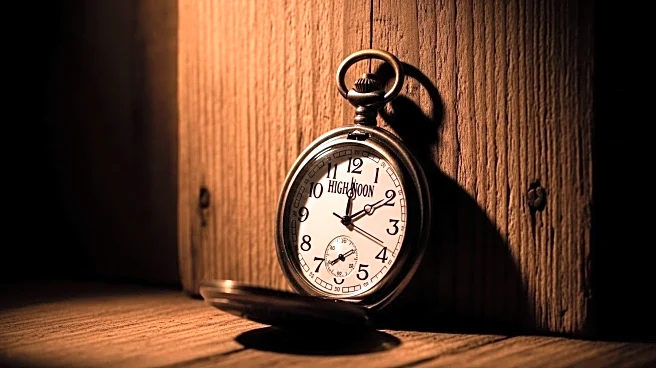What's Happening?
Billy Crudup and Denise Gough are set to star in the world premiere of the stage adaptation of the classic western film 'High Noon' in London's West End. The production, directed by Thea Sharrock, will run at the Harold Pinter Theatre from December 17 to March 7. The play, adapted by Oscar-winning writer Eric Roth, follows the story of Marshal Will Kane, played by Crudup, who faces a gang of gunslingers on the day of his retirement and wedding. The adaptation is produced by Paula Wagner, Tom Werner, Thomas Tull, Danny Cohen, and Len Blavatnik. 'High Noon' is historically significant, having been released during the McCarthy era, and is seen as a critique of McCarthyism.
Why It's Important?
The stage adaptation of 'High Noon' is significant as it revives a culturally and politically charged narrative that resonates with contemporary audiences. The original film was a response to the political climate of the 1950s, particularly the Red Scare and McCarthyism. The adaptation's debut in London highlights the enduring relevance of its themes, such as courage and standing up against oppression. The production also showcases the talents of Crudup and Gough, both acclaimed actors with strong stage backgrounds, potentially drawing significant attention and audiences to the West End.
What's Next?
The production of 'High Noon' may head to Broadway if it proves successful in London. The adaptation's political themes could spark discussions and interest among audiences, potentially influencing future stage productions that tackle similar issues. The involvement of high-profile actors and producers suggests that the play could have a significant impact on the theater scene, both in London and potentially in the U.S.
Beyond the Headlines
The adaptation of 'High Noon' not only revives a classic film but also serves as a reminder of the power of art to reflect and critique societal issues. The play's themes of justice and moral courage are timeless, offering audiences a chance to reflect on current political climates and the role of individuals in challenging oppressive systems. The production's success could encourage more adaptations of politically charged narratives, fostering a theater culture that engages with contemporary issues.









